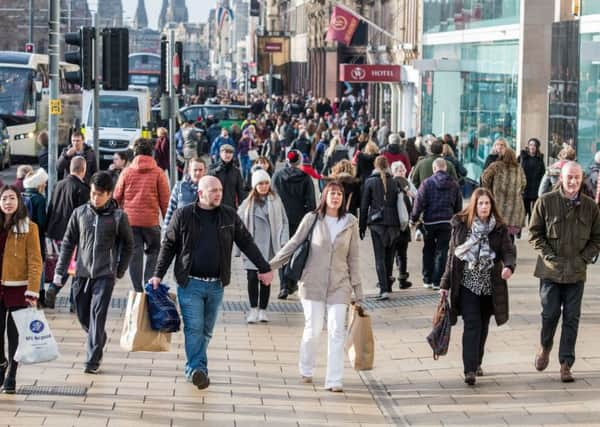Economy facing slowdown as confidence wanes
This article contains affiliate links. We may earn a small commission on items purchased through this article, but that does not affect our editorial judgement.


The latest revisions to gross domestic product (GDP) during the closing months of 2016 were broadly in line with expectations but the underlying picture points to an economy that may have peaked.
According to the Office for National Statistics (ONS) and its second estimate of UK growth, GDP expanded by 0.7 per cent in the fourth quarter, compared to the previous three months. That is up 0.1 per cent from an initial reading of 0.6 per cent and in line with what several economists had been anticipating.
Advertisement
Hide AdAdvertisement
Hide AdThe upward revision was underpinned by a robust 1.2 per cent rise in manufacturing output, and a 0.8 per cent increase in the powerhouse services industry, marking its 16th consecutive quarter of growth.
But on the flip side, GDP for the whole of 2016 was revised down by a not insignificant 0.2 per cent to 1.8 per cent, leaving it well shy of the 2.2 per cent racked up in 2015. It means the UK has lost its title as the fastest growing economy among the G7, which includes countries like Germany, the US, Canada and Japan.
Dig a little deeper into the data and there are other warning signs. Business investment, for example, fell 1 per cent to
£43.5 billion between October and December, due to weak spending on information and communication technologies, buildings and structures excluding homes, and other machinery and equipment.
Overall, business investment slid 1.5 per cent between 2015 and 2016, equal to some £2.7bn, and marking the first annual decrease since in seven years. Experts have been predicting that jitters following last June’s EU referendum would lead to a weakening in corporate expenditure.
Howard Archer, chief European and UK economist at forecasting consultancy IHS Global Insight, points to mounting evidence that consumers – the driving force of Britain’s economy in recent years – are reining in their spending amid an inflationary squeeze on their purchasing power. He suggests that the fourth quarter of 2016 may be “as good as it gets for some time for the UK economy”.
“Evidence of consumer spending slowing is potentially highly significant – as the resilience of the economy over the second half of 2016 was largely due to consumers keeping on spending after June’s Brexit vote,” he notes. “[It] reinforces our belief that 2017 is likely to be an increasingly difficult year for the UK economy. Like a slow puncture, we suspect that the economy will gradually lose air as the year proceeds.”
Advertisement
Hide AdAdvertisement
Hide AdArcher is forecasting GDP growth to moderate to 1.6 per cent this year, as consumers tighten their purse strings and businesses become increasingly cautious over investment amid a backdrop of Brexit negotiations and global uncertainty. He warns that the fundamentals for consumers will “highly likely be challenging again in 2018”, with GDP growth pegged at 1.2 per cent.
Earlier this week, economic think-tank the EY Item Club said the Office for Budget Responsibility – Britain’s fiscal watchdog – was likely to revise up growth predictions for the UK economy to 1.7 per cent from 1.4 per cent for this year, a forecast in line with a number of other organisations and economists.
Nancy Curtin, chief investment officer at Close Brothers Asset Management, believes that the weaker pound following the Brexit vote acted as a “shock absorber” during the fourth quarter of 2016, but also cautions that “uncertainty lies on the horizon”.
She says: “[Chancellor Philip] Hammond has already hinted that he has a £27 billion fiscal stimulus up his sleeve to help maintain momentum in the economy.
“With Brexit negotiations afoot and ongoing geopolitical concerns among the G7, the knock-on effect on business confidence may slow the pace of growth in 2017, both at home and abroad.
“We also need to acknowledge that a big driver of UK growth in Q4 last year came from consumption, but with prices on the rise consumers may start to rein in spending, something we’ve already seen in the drop in retail sales at the beginning of this year.”
That cautious outlook is echoed by Shilen Shah, a bond strategist at Investec Wealth & Investment, who notes: “Looking forward, a slowdown in consumer spending is likely in 2017, as higher inflation hits consumers in the wallet. A slowdown in GDP growth in 2017 therefore currently looks inevitable.”
Britain may have surrendered its title as the fastest growing country in the G7, and the smart money is on a marked loss of momentum in the months ahead, yet the economy has performed resiliently so far in the aftermath of the EU vote and in the face of considerable headwinds. It may well end up confounding the doomsayers in 2017 and into next year if consumers and businesses alike continue to spend and invest.
